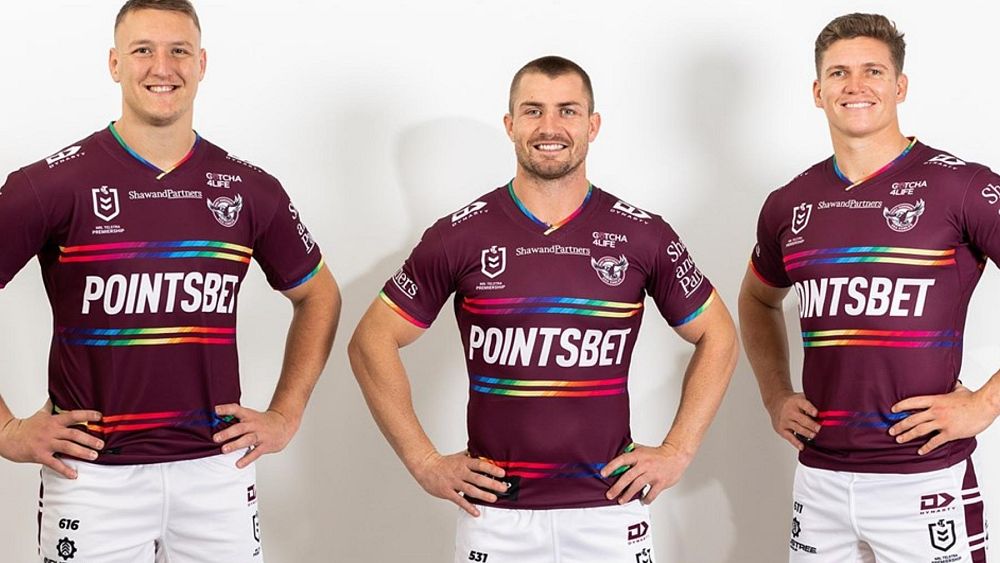
Seven players from the Australian rugby league team Manly Warringah Sea Eagles have refused to play in an upcoming game because the club wants them to wear a Pride shirt to support LGBTQ+ inclusion in sport.
The team was set to wear the jerseys, with rainbow stripes and a rainbow collar, at a match on Thursday against rivals the Sydney Roosters.
But the seven players told club officials that wearing the jersey conflicts with their cultural and religious beliefs — even though the specially-designed kit has been a huge hit with the team’s fans.
“The players will not play on Thursday and we accept their decision,” said Sea Eagles coach Des Hasler.
“These young men are strong in their beliefs and convictions and we will give them the space and support they require,” he added.
“The playing group are solid and understanding of each other’s views. As a club we will wear the jersey on Thursday night.”
The seven players — Josh Aloiai, Jason Saab, Christian Tuipulotu, Josh Schuster, Haumole Olakau’atu, Tolu Koula and Toafofoa Sipley — are not available for selection on Thursday. Rugby league squads contain 13 starting players and four on the interchange bench for each game.
Hasler apologized for the fallout which stemmed from the club’s lack of advance consultation with the playing group.
“Our intent was to be caring towards all diverse groups who face inclusion issues daily,” Hasler said. “Sadly this poor management has caused significant confusion, discomfort and pain for many people, in particular those groups whose human rights we in fact attempting to support.
“We wish to apologize to the LGBTQ community who embrace the rainbow colors, who use these colors for pride and advocacy and human rights issues.”
Reaction from league officials
Australian Rugby League Commission chairman Peter V’landys said he understood the players’ choices, based on religious and cultural differences, but pushed for inclusion and acceptance in the sport.
“One thing I take pride in with rugby league is we treat everyone the same,” V’landys said. “It doesn’t matter your colour, sexual orientation or race. We’re all equal.”
“We’ll never take a backward step in having our sport inclusive. But at the same time we will not disrespect our players’ freedoms.”
The NRL does not have a designated Pride round, but V’landys said it could be a consideration for future seasons.
Andrew Purchas, co-founder of the Pride In Sport program that supports Australian sports clubs in aspects of inclusion, acknowledged the apology from the Sea Eagles.
“Conversation, education and building understanding are key to respectfully moving forward on these important discussions in our communities,” Purchas said in a statement. “At its most basic, a Pride jersey signals a fundamental value: everyone should feel safe to play.
“We strongly support the NRL in its endeavours to continue to uphold values associated with inclusivity, safety and belonging, and we would urge all people to think about these as non-controversial values we can unify around.”
The Sea Eagles are in ninth place in the NRL, one spot below the Roosters. The top eight teams qualify for the playoffs.
Manly was the only club planning to wear a pride jersey in this round.
Former Manly forward Ian Roberts, who in the 1990s was the first high-profile rugby league player to come out as gay, said he was not surprised by the players’ decision.
“It hasn’t totally shocked me like it’s shocking everyone else,” he told the Sydney Morning Herald. “As an older gay man I’m used to this. I expected there would be some sort of religious pushback.”
Local media reports said the Manly players were not aware they would be expected to wear the jersey until after it was shown to the media.
NRL rules don’t allow the seven players to wear an alternate jersey without the rainbow messaging because match regulations require all players in a team to wear an identical strip.
The pride jerseys were a hit with fans, with local media reporting the club had sold out of initial stock of all men’s and women’s sizes.
